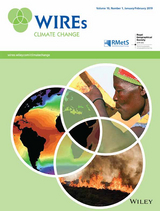
Promises and risks of nonstate action in climate and sustainability governance
Chan, Sander / Idil Boran / Harro van Asselt / Gabriela Iacobuta / Navam Niles / Katharine Rietig / Michelle Scobie / Jennifer S. Bansard / Deborah Delgado Pugley / Laurence L. Delina / Friederike Eichhorn / Paula Ellinger / Okechukwu Enechi / Thomas HaleExternal Publications (2019)
in: Wiley interdisciplinary reviews: climate change 10 (3), article e572
DOI: https://doi.org/10.1002/wcc.572
Open access
Sustainable Development Goals and the Paris Agreement stand as milestone diplomatic achievements. However, immense discrepancies between political commitments and governmental action remain. Combined national climate commitments fall far short of the Paris Agreement's 1.5/2°C targets. Similar political ambition gaps persist across various areas of sustainable development. Many therefore argue that actions by nonstate actors, such as businesses and investors, cities and regions, and nongovernmental organizations (NGOs), are crucial. These voices have resonated across the United Nations (UN) system, leading to growing recognition, promotion, and mobilization of such actions in ever greater numbers. This article investigates optimistic arguments about nonstate engagement, namely: (a) “the more the better”; (b) “everybody wins”; (c) “everyone does their part”; and (d) “more brings more.” However, these optimistic arguments may not be matched in practice due to governance risks. The current emphasis on quantifiable impacts may lead to the under‐appreciation of variegated social, economic, and environmental impacts. Claims that everybody stands to benefit may easily be contradicted by outcomes that are not in line with priorities and needs in developing countries. Despite the seeming depoliticization of the role of nonstate actors in implementation, actions may still lead to politically contentious outcomes. Finally, nonstate climate and sustainability actions may not be self‐reinforcing but may heavily depend on supporting mechanisms. The article concludes with governance risk‐reduction strategies that can be combined to maximize nonstate potential in sustainable and climate‐resilient transformations.


